Summary 
Sensitively directed fantasy romance with a superlative Caliban and an eloquent old Prospero. A blue-painted Ariel leads a Chorus of angelic blue sprites, and the supporting cast includes a lovely Miranda and an amiably drunken minstrel Stephano. Enhanced by special effects that feature a monstrous vulture-dinosaur beast-puppet booming threats from the balcony and a trio of veiled goddess-puppets delivering benediction in shimmering white. A tale of freedom and independence with undercurrents of forgiveness and blooming romance, staged with a keen sense of comedy.
Design
Directed by Deb Alley. Costumes by Holly Cole. Set by Fred M. Duer. Lights by Julie Mack. Sound by Joshua Court.
Cast
David Sitler (Prospero), Katrina Kuntz (Miranda), Gerson Dacany (Ariel), Kareem Bandealy (Caliban), George Judy (Alonso), Brian Rooney (Gonzalo), David Marcotte (Antonio), Kevin Rich (Sebastian), Benjamin Cole (Ferdinand), Chris Amos (Trinculo), Patrick New (Stephano).
Analysis
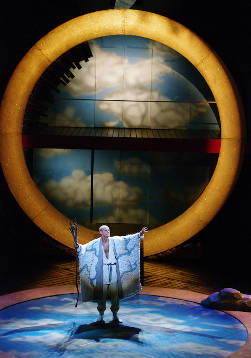
The final performance of Deb Alley's sensitively directed The Tempest closes the 2010 Illinois Shakespeare Festival. Rumbling thunder and rainfall sound effects begin even as the audience takes their seats amid the noise of creaking timber from a foundering wooden ship. A golden circle towers upstage, the top high above the balcony near a sky-blue butterfly, and twin royal blue sails obscure the stage, tied off criss cross with heavy bright red rope. One side of the golden circle is lined with Prospero's handsome leather-bound books, and onstage can be spotted a few boulders as well as stacked firewood and coils of rope. Two sets of stairs lead to the red-painted balcony, the stairs brown at the base but becoming blue higher up, and upstage is an inner circle under the golden halo, with a cloudy blue sky painted just beyond.
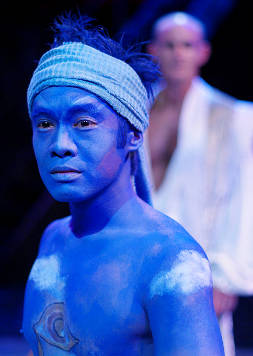
Alley begins the production with three sailors scrambling on deck 1.1 all clad in black, from headgear to belts and boots. Ariel and his head-banded spirits - something of an omnipresent Chorus - run among them, their faces and torsos painted blue with puffs of white clouds, and they have white-gauzed feet and blue mesh jackets. Ariel is easily discerned among the Blue Man Group sprites by the tattooed eye upon his chest weeping a single tear drop, and he leads them as they twist the sails and summon more winds. Ariel leaps and leg kicks within the howling storm as Gonzalo, a bearded old man in purple garments, cowers beneath a red blanket and the sailors roll upstage as if a wave crashes over them.
In sudden quiet, Prospero and Miranda emerge, both in ethereal white and gray garments. The steely-eyed Prospero, a lean and tanned older man, stands bare-chested in an alpaca cloak with pastel yellow, green and blue, and the dark-haired Miranda wears a veiled gown and silver sandals. David Sitler's wise old Prospero calms his concerned daughter - "no harm done" - and as soft musical notes play, recounts his story in a protracted sequence that Alley saves from becoming tedious with some interesting staging. Prospero wields a twig-laden wooden staff with an orb at the end, and his story of exile at the hands of his brother - "good wombs have borne bad sons" - and his ensuing revenge is pantomimed by Ariel and the Chorus in ballet-like movements. They flail their arms for the storm, quiver their upraised hands for the masts straining in the wind, and move dance-like for the mariners struggling in the sea. After the mariners' words are expressed - "hell is empty and all the devils are here" - Ariel balks at more commands from Prospero, deeply intoning, "is there more toil?" The Chorus then pantomimes Ariel's imprisonment by the witch Sycorax, surrounding Ariel and raising their arms, groaning at his torment, then dropping away when Prospero describes how he had saved him.
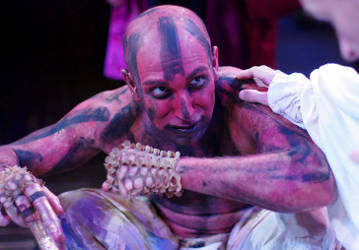
The production elevates 1.2 with the appearance of Kareem Bandealy's black-mottled red-skinned demon Caliban. Bandealy's animalistic Caliban emerges from a stage trap, lit scarlet red from underneath as if ascending from hell, and flings a cord of wood across the stage. Completely bald with black lips and dark-rimmed circles around his eyes, he scuttles across the stage while complaining in a poetic growl. Bandealy's Caliban wears scaly gloves with two long sharp-clawed fingers on his right hand, and he moves like a cross between a crab and a monkey, glowering at the audience - "I had peopled the island with Calibans" - and jumping atop a boulder to spit at Sitler's Prospero. Bandealy brilliantly embodies the fear, anger and resentment within Caliban, shouting 2.2 as he hauls a pile of firewood onstage atop a heavy length of cloth, cowering beneath the blanket to hide from night-time animal cries, and jumping up and down on his haunches to animatedly complain to the rapt children watching from the front row (much to their delight). Caliban's interaction with Trinculo - "well, what have we here" - and the drunken musician Stephano - "he shall taste of my bottle" - provides the production's most light-hearted and genuinely funny moments. When the wet-haired Trinculo taps Caliban's shape concealed beneath the blanket, he gets a rhythmic tap of Caliban's claws in response: "this is no fish!"
A yellow-shirted Patrick New as Stephano enlivens the already humorous scenes with his ukulele and slurred singing, drunkenly lurching to the stage from deep within the audience. After dancing upon a boulder, he discovers the four-legged Caliban-and-Trinculo monstrosity and shares from his sack of wine, spraying streams of sack into the mouths and all over Caliban and Trinculo until the two are drunken and jostling for position - "I shall pour some in thy other mouth" - to receive the next alcoholic stream. By 3.2, New's Stephano wields two sacks of wine and emits a constant spray, Caliban drinking some and even spitting a little, showering beneath the spray and chasing dutifully after Stephano and begging for more on his knees. Caliban pulls a blanket over Stephano's shoulders and receives an affectionate pat on his bald red head, much to Trinculo's dismay. The tall and lanky Chris Amos plays Trinculo as an amiable dolt, right down to cartoon character expressions, becoming embroiled in a comic sibling rivalry with Bandealy's Caliban, who flashes his claws, growls at Trinculo, and leaps to attack. Amos' Trinculo speaks proudly to the audience - "I can swim like a duck" - stutters over the word "abominable," is shushed repeatedly by Stephano, and is set up by Ariel 3.2, who imitates his voice to infuriate Caliban. After being cheered by a Stephano song - "flout 'em and scout 'em!" - Bandealy's Caliban muses poetically about the island - "when I waked I cried to dream again" - in a particularly mesmerizing image that blends poetry with a midnight stage picture, as he squats upon a boulder like a beast while gazing at the sky like an angel. By 4.1, Stephano and Trinculo wear muddy red jumpsuits in an interesting approximation of the color scheme of Bandealy's Caliban, having descended to baseness, and they are splattered with dirt and grime. As Prospero watches from the balcony, they jump at the chance to change into the brocade and velvet garments brought onstage by the blue fairies. They don jackets and hats to pose and pretend to be politicians giving speeches, marching about the stage until the spirits gather on all fours to growl furiously at them like a pack of attack dogs, then chase them yelling offstage.
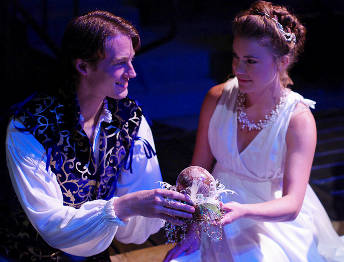
Alley expertly weaves the romance of Miranda and Ferdinand among the sequences of broad comedy. The 1.2 meet-cute takes place with Ariel leaping onstage to sing while the blue sprites hum along and make sound effects like bird calls and sonic groans.
In inspired casting, Ferdinand and Miranda are played by the same performers who enact Fenton and Anne Page in the Festival's concurrent The Merry Wives of Windsor, and the two share deeper chemistry in this production. Miranda appears particularly enamored, leaning way over to peer beyond Prospero at the tall and long-haired Ferdinand, or watching in admiration from above as he hauls firewood, then kneeling in front of him to end his toil. The handsome young Ferdinand, in turn, hands his weapon over to Prospero with a stern expression 1.2 but turns to grin boyishly at Miranda, and in 3.1 he kneels with her, taking her hands so they rise together. Sitler's Prospero behaves like a watchful father, listening from the balcony - "thou art infected" - as Miranda stands upon the steps admiring Ferdinand below.
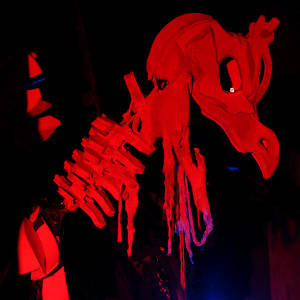
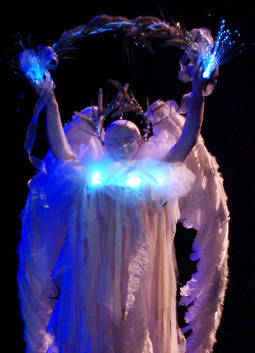
Alley lights the old world survivors in bright yellow sunlight 2.1, led by the sad-eyed Alonso in a red doublet with a gold chain and a wide black belt. After Ariel prevents an assassination attempt - the mullet-haired Antonio glowering with malevolence - the survivors enjoy flower garlands and cornucopias of fresh fruit 3.3, indulging themselves until Ariel punishes them with a frightening and high-volume Harpy. A puppetry beast looms in the balcony - a streamer-laden vulture-dinosaur monstrosity with a neck ribbed with bones and a sharp-edged beak - screaming bird calls and admonitions in an amplified voice from Ariel himself, perched even higher above. The shadowy orange-eyed special effect casts red-light shadows behind it as its wings move angrily, the men below crying out and cowering in fear. Alley again uses special effects 4.1, but of a much more benign nature, with three summoned goddesses arriving as veiled spirits held aloft on poles by Ariel and the sprites. The spot-lit goddesses sway in shimmering silver and white far above the stage to bless the young new couple. Ferdinand and Miranda receive Prospero's blessing as he brings their hands together, but he interrupts their first kiss - "no tongue...all eyes" - so they can receive the amplified benediction from the hovering angels. The young couple dances center stage before accepting wreaths around their necks, and Sitler's subtly conflicted Prospero seems both deeply happy and deeply saddened - "all revels now are ended" - as he prepares to end his life on the mystical island: "we are such stuff as dreams are made on." The moment, ending a magical career and forsaking the wonder of books, certainly invites comparison to Shakespeare's own retirement, in what may be the Bard's last dramatic effort, and Prospero's anger - "I will plague them all!" - subsides to gentle sympathy ("the rarer action is in virtue") as he relents, to Ariel's smiling approval.
Alley's delicate balance - Prospero' sorcery, the romance of Ferdinand and Miranda, the ethereal Ariel, the comical drunkards, and most especially the demonic brute Caliban - lends smartly toward the quietly moving 5.1 conclusion. Sitler's Prospero walks alone to a center stage spotlight amid a thrumming hum sound effect - "this rough magic I here abjure" - and drops to his knees: "I'll drown my book." Joined first by the shaken survivors - Alonso groans and collapses in guilt, and Sebastian sags to his knees - then by Ariel solemnly singing of "where the bees suck," Sitler delivers a poignant conclusion.
One of Ariel's fairies relieves him of his wand and orb, another takes the alpaca robe from his shoulders, and yet a third replaces it with the robe of a Duke. Ariel finishes his song in tears, and Sitler's Prospero musters courage and embraces Alonso as the lights rise and Miranda and Ferdinand arrive, hand-in-hand. Miranda, overwhelmed by all the humans - "brave new world!" - watches her father forgive even those who do not deserve it, like Antonio, who stomps off upstage in anger, and the unrepentant Caliban, who punches Stephano in the bottom as the drunkard exits. Soon, Sitler's Prospero is alone with Ariel, who has gifted him - as have Ferdinand and Miranda - with the inner strength to forgive, and the friends stand together for the final time in a triple spotlight. As the lights slowly dim, the old sorcerer gratefully tells his friend, "into the elements be free."